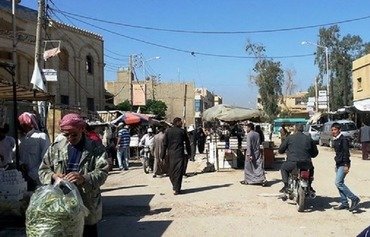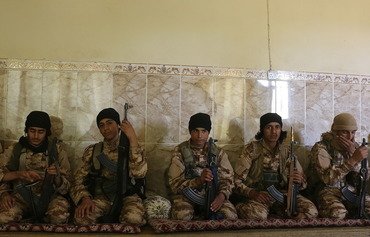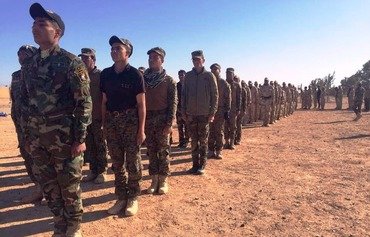Residents of al-Qaim in Iraq and the adjacent city of Albu Kamal in Syria are living under extremely difficult conditions after more than two years of "Islamic State of Iraq and the Levant" (ISIL) rule, local officials told Diyaruna.
Al-Qaim and Albu Kamal are under tight siege and have been cut off from the outside world as ISIL has severed telephone and Internet service.
Residents who fled have been the only source of information about the violence and persecution residents face on a daily basis, they said.
Al-Qaim resident Abu Maher, using a pseudonym out of concern for the safety of his relatives, told Diyaruna he recently fled his hometown.
He described life in the ISIL-controlled border town as "hell".
"Our lives were bleak. We did not leave our house, except when it was absolutely necessary, for fear of harassment by terrorists," he said.
The group detained local residents at random, he said, often accusing them of treason and punishing them with imprisonment or death.
Residents lived in fear of ISIL's hesba (religious police), who "implement the orders of the group and punish violators", he said.
"We lived in real horror," he said. "Every day would pass like a year of hell. We heard of arrests and executions that affected men and even entire families every day."
People who do not die at the hands of "terrorists" die due to "hunger, poverty and disease", he added. "We had no work, medicine or public services."
Escape from persecution
On December 29th, Abu Maher and his family fled with 100 other families and took refuge in the Kilo-18 camp west of Ramadi.
The escape was risky, he said, "but thanks to the grace of God, we took desert routes until we reached the security forces in al-Rutbah and survived".
Since ISIL overran al-Qaim in the summer of 2014, about 80% of the city's 200,000 residents have escaped, al-Qaim mayor Farhan Fitaikhan told Diyaruna.
"The city today is almost vacant of its residents, who are persecuted and forced to leave their homes and flee to nearby liberated cities such as al-Rutbah because of ISIL's violence," he said.
Families were not concerned about the risk of escaping as they had been suffering so much from the "cruelty and crimes of the terrorists", Fitaikhan said.
"ISIL elements turned al-Qaim into a large prison," he added. "No one was spared their arrests -- even the elderly, women or children."
ISIL has not told the families of residents it has detained what it has done with them, he said, adding that "ISIL does not hesitate to kill anyone it doubts".
Theft and destruction
"The house of a family that flees from their grip is blown up or burned," Fitaikhan said, and their personal possessions "are confiscated to be sold".
Assistant governor of Anbar Turki al-Mahalawi told Diyaruna that ISIL seized his tribe's houses and agricultural land, and sold their personal property across the border in Albu Kamal.
"They stole everything and sold it; Furniture, electric appliances and cars," he said. "They loot everything that exists in any home whose owners flee."
ISIL cut telephone communications and Internet service for fear residents would reveal their headquarters and hideouts and they would be targeted by Iraqi and coalition airstrikes, al-Mahalawi said.
"People trapped there complain of ISIL's tightened grip on them as they force everyone, without exception, to pay taxes despite their dire living conditions and lack of services," he added.
In December alone, al-Mahalawi said, ISIL detained about 300 al-Qaim residents who had served in the military or the local police force.
"ISIL's series of crimes against the people of al-Qaim and the Syrian city of Albu Kamal is ongoing," he said.
Anbar provincial council member Athal al-Fahdawi told Diyaruna that residents in the border areas between Iraq and Syria are living under tragic circumstances.
"ISIL is besieging the residents there, treating them with cruelty and inhumanity," he said. "The only solution to save them is by freeing them and ending the influence of terrorists."
In early January, he said, Iraqi forces and tribesmen launched a military operation to take back the border areas from Anah to al-Qaim .
"We will expel the last terrorist from our province," he said.

![Iraqi forces, supported by local tribesmen, are on the move to liberate al-Qaim and other areas on the border with Syria. [Photo courtesy of Anbar's emergency regiment]](/cnmi_di/images/2017/01/25/7099-Iraq-Qaim-border-600_384.jpg)






